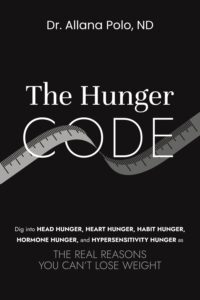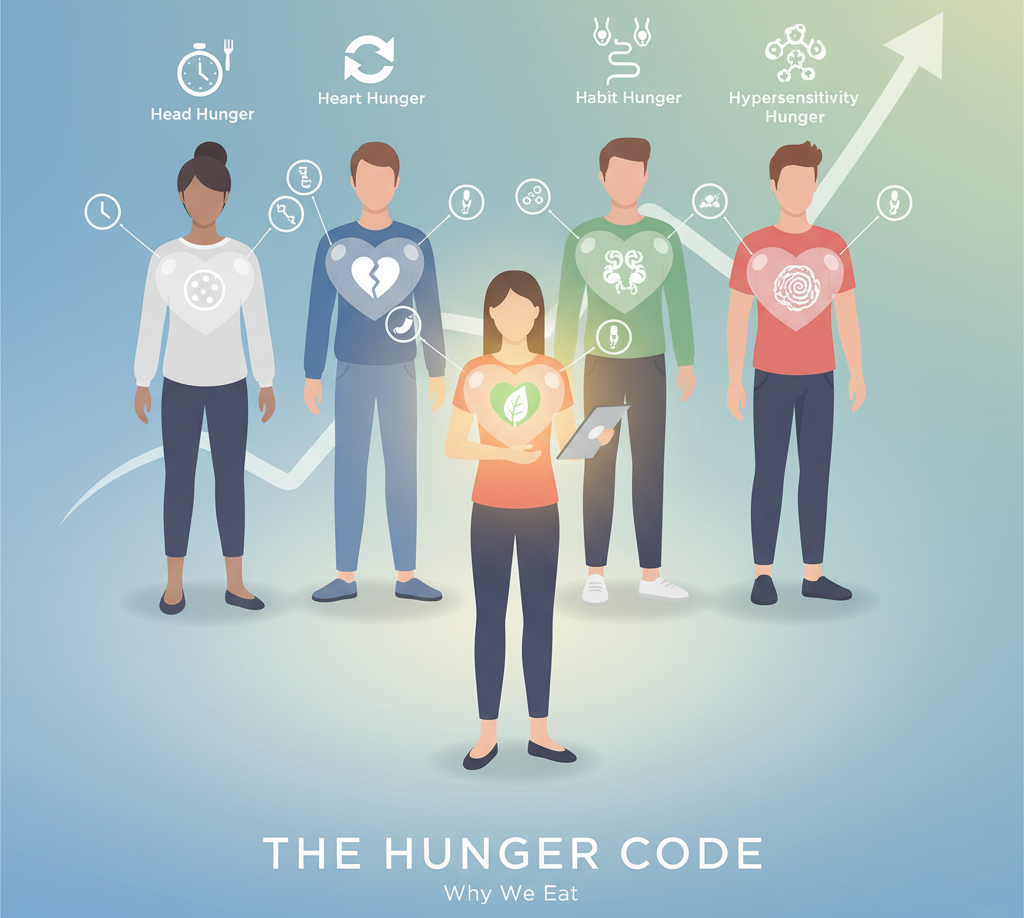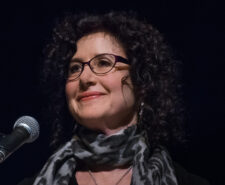Why we really eat
The vicious cycle of willpower: how to stop fighting hunger and start interpreting it as information for lasting wellness.
November 13th, 2025

Allana Polo is the founder of Polo Health + Longevity Centre, specializing in weight management hormone health and longevity medicine.
“Science is an art, and we are complex human beings and emotional beings. I wrote The Hunger Code to bridge both—the biology of hunger with the psychology of eating.”
The complex question of why we eat is the focus of the Amazon Canada #1 Bestseller, The Hunger Code: A New Way to Understand Why We Eat (DAZL press $34.99), by naturopathic physician, Dr. Allana Polo. The book is not a diet guide, but a compassionate exploration of the five distinct types of hunger that drive eating behaviors derived from Dr. Polo’s realization that most people struggle to understand why they are hungry and that it is not about willpower. These types are identified as Healthy Hunger, Head Hunger, Heart Hunger, Habit Hunger, Hormone Hunger and Hypersensitivity Hunger. BCBookLook conducted the following interview with Dr. Polo.
*
BC BookLook: What was the creative process like for you to categorize feelings like Heart Hunger or Habit Hunger and define the five distinct “Hungers” with such simple language?
Allana Polo: After 15 years in practice and thousands of conversations with patients, I started to hear the same themes repeat themselves—eating from emotion, from routine, from hormone imbalances and from fear. I realized these weren’t random patterns, but rather they were categories of hunger that told a story about what each person was struggling with—inside and outside my office. We are so overwhelmed with day-to-day information, breaking something down that feels personal, relatable and tangible, was why I created these 5 distinct hungers, in a simplified way. Heart Hunger instantly connects to emotional eating. Head Hunger speaks to our rule following tendencies, Habit Hunger reflects routine and repetition. By naming them simply, it gave people a more accessible way to recognize and understand their hunger without shame—to say “Oh, that’s Heart Hunger talking, instead of ‘I have no willpower’.” This was the bridge to self-awareness.

Version 1.0.0
As a naturopathic doctor, I’m deeply grounded in physiology and biology with things like hormones, metabolism, and metabolic function. But as a clinician with an undergraduate in psychology, I have empathy and compassion for the emotional side of medicine—mind body medicine. It can’t all be physical, it is about connecting the dots between physical medicine and emotional medicine. Science is an art, and we are complex human-beings and emotional-beings. I wrote The Hunger Code to bridge both—the biology of hunger with the psychology of eating. Each chapter pairs science with a story—the mechanism, and then how it shows up in real life. That balance makes the work deeply human and relatable.
BCBL: Can you describe the specific moment or patient story that made you realize the entire diet industry was missing this “Hunger Code”?
AP: I realized that most of my patients weren’t failing diets because they lacked willpower; they were trying to control their hunger or food intake without ever understanding it. They were trying to adhere to strict rules and guidelines, or diets they heard they “should” try without connecting with what their body needed. The real turning point for me came when I started asking people why they were eating, instead of what they were eating. That question revealed patterns—emotional, habitual, and hormonal and schedules, that changed everything for me. The concept behind The Hunger Code became apparent as I heard the same things from people over and over again. It was so much more than a diet or willpower. It was subconscious. The Hunger Code was born out of those conversations, and my desire to help them get off the yo-yo dieting rollercoaster one last time.
Diet culture perpetuates restriction, stigma, shame, and non-productive outlets. I have seen firsthand how damaging that can be, and for many, perpetuates the vicious cycle of guilt, the yo-yoing, and the belief that your worth is tied to your weight. I wanted to create a compassionate framework that helps people become curious instead of critical. Awareness, education and empowerment leads to change—punishment never does. Consistency over perfection. This is the foundation for sustainable change and transformation.
BCBL: Which of the five Unhealthy Hungers do you find is the most difficult for people to recognize as a silent, physical response to everyday stress?
AP: Heart Hunger and Emotional Hunger eating often disguises itself as physical need. That gnawing sensation in your stomach after a tough day, or stressful moment, or the urge to eat at night when the house finally quiets down. It isn’t about the food. It is about the outlet, the comfort and relief.
Chronic stress keeps our body in fight or flight mode, and food can become a coping mechanism to deal. What makes it tricky, is that stress feels physical—so people misinterpret it as hunger. Low energy, weakness, anxiety, until we address the emotional loads underneath, Heart Hunger will remain.
Head Hunger tends to surprise people the most—the hunger driven by time, rules, or fear of getting hungry. We’ve been conditioned to eat by the clock as a cue for hunger, or follow external rules/ advice from others about when or what we should be eating, that we have lost touch with our internal hunger cues. When they discover that their 12 p.m. “lunchtime hunger” might actually be conditioning—not true hunger, it’s a lightbulb moment.
Head Hunger is the most surprising for people because they don’t necessarily realize they are doing it, but Habit and Heart are the most common.

Illustration by Brian Nguyen
BCBL: As a physician, have you noticed any unique local patterns that tend to activate one of the Unhealthy Hungers in your Vancouver-area patients?
AP: Absolutely, Vancouver is full of busy professionals, parents, entrepreneurs, who constantly live in a fast-paced lifestyle. This pace fuels Head Hunger and Habit Hunger; eating by the clock or when they have time, skipping meals, over-caffeinating, and then over-eating at night because they finally stop. We also live in a wellness focused city, which ironically adds pressure to look and feel a certain way. People work out daily, try to “eat clean”, which adds timelines, pressure and guilt based eating patterns. It is a fine line between genuine self-care and perfectionism.
We are also post pandemic, more loneliness and weight gain during that period. People are trying to come back to an emotionally and physically healthier place, but we are seeing long term and chronic impact from that period as well.
The myth that willpower is the key to weight loss. It’s not. That metabolism slows down as we age, and weight loss is as simple as calories in/calories out. These are all myths we’ve been told about weight loss, and they are simply not the case. Hunger isn’t to be feared, it is a signal. It is about how we answer hunger, what and why we are eating. Real success comes from decoding hunger’s language. The hormones, habits, emotions, gut health and mindfulness with it instead of fighting it.
BCBL: If a reader were to take only one lesson from The Hunger Code to apply every single day for the rest of their life, what would that be?
AP: Pause before you eat and ask yourself’ What kind of hunger is this?
Am I thirsty? Am I tired? Am I bored? How will I feel after I eat this? These questions change everything because they shift you from autopilot to awareness, from reacting to responding. Whether it is emotional, habitual, physical or hormonal, understanding why you are hungry gives you back your power. When you learn to interpret hunger as information, rather than the enemy, you can finally eat with awareness, live with freedom, and start loving your body. That is what the hunger code is about. Not silencing hunger, but understanding it and responding to it in a productive way in alignment with your goals.
Next, remove some of the noise and distraction—screens at meals, multitasking, eating on the go. Slow down! True hunger builds gradually and is satisfied by real food—emotional or habitual hunger is urgent and often tied to a specific craving, emotion, or association. The more we practice that awareness, the more we reconnect to our body’s wisdom.
My hope is to help you get off the rollercoaster. To eat intuitively and understand that your body is not the same as your sisters, your neighbours, or your husbands’ coworkers and what has worked for them might not what works for you. When you learn to interpret your hungers, you gain control without the need to control.
 9781069533500
9781069533500


Leave a Reply